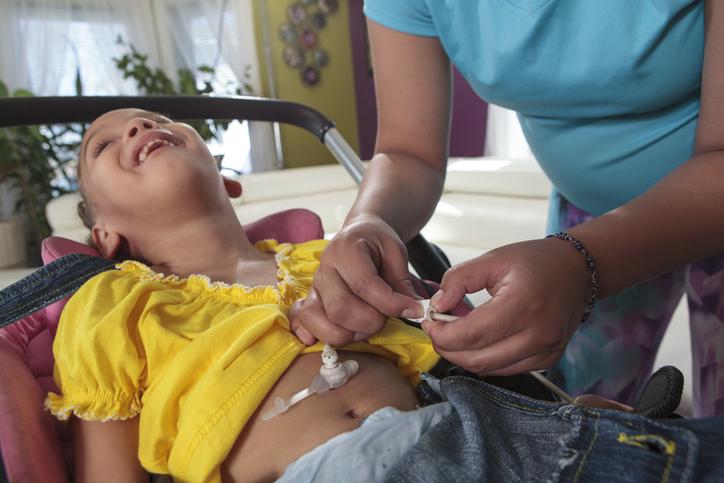High intensity health-related support work
High intensity support involves working with participants who require more specialised, health-related support. The support required is described in a support plan and developed for the participant by an appropriately qualified health practitioner. Support workers play a role in implementing these plans, and usually work under direction of the health practitioner. These supports represent some of the highest risks for participants, workers, and others. Specific additional skills and knowledge are required to deliver high quality and safe supports in these areas.
This can be life-changing work. Having workers who can deliver more specialised health supports can mean a participant can live with their family, in their community and still get the support they need. It could be a key factor in deciding whether a person can leave hospital and return home. This type of support can also support a participant to be independent, enabling them to have more choice and control in how they live their life.
Role profile

Aparna is a disability support worker who also provides in-home support and high intensity health supports to some participants.
Can you describe what you do in a few sentences?
I provide a wide variety of support services to NDIS participants. I’ve done a lot of community access, personal care and general life skills. Now I do PEG feeding, injections, and cleaning and hygiene.
What does a regular day look like?
If I’m working with someone who I support with community access and daily living skills, we’ll check in when I arrive, then plan out the day, where we might do some cooking, cleaning or go to the shops!
What’s the best part of your role?
I’ve been able to support participants through many different stages of life and learning skills to support them through different challenges. It has been such a valuable experience!
What are the biggest challenges?
The biggest challenge is managing time across the multiple participants I support. I need to be strategic about how I can set up my day and what I do with different participants.
How did you get into your current role?
I got into high intensity support work because I was supporting someone whose condition deteriorated to the point where they required regular subcutaneous injections and PEG feeding. To help keep the rest of their life stable, I got trained (with the support of my organisation) in providing this level of support.
What advice do you have for someone wanting to get into your line of work?
The main thing is to ask for help when you need it. Take the opportunities that are given to you, and don’t be afraid to ask for opportunities and training. We’re working for the participants, and any way that we can help them live their best life is a great achievement.
Where do you see your career going in the future?
I love what I do, helping people live their best lives and I can’t see it changing anytime soon!
Capabilities
The NDIS Workforce Capability Framework outlines core capabilities for General and Advanced Support Work. The additional capabilities detailed in the Framework relevant to providing higher intensity health-related support include:
- Support me to implement my health and allied health support plans
- Support me to implement my mealtime plans
- Support me to implement my medication plans
As well as reviewing the capabilities above, those interested in High intensity supports can review additional guidance on skills and knowledge for workers in the High Intensity Support Skills Descriptors These include supports for:
- Complex bowel care
- Enteral feeding and support
- Dysphagia support
- Ventilation support
- Tracheostomy support
- Urinary catheter support
- Subcutaneous injections
- Wound and pressure injury support
Things to consider
High intensity support work can be intimate and intensely personal, working with some of the most at-risk and vulnerable people. Things that you should be aware of include:
- You will need to demonstrate the sensitivity and empathy needed to deliver intensely personal supports in ways that put people at ease and give them confidence.
- You will need to develop some basic knowledge about how the body works and practical skills to know what to do to deliver the required support, how to identify risks and who to go to if there is a problem. You could consider further study in health-related courses such as nursing.
- You need to be comfortable with following instructions from others. It is critical that you follow the procedures outlined in the support plan.
- You will be the ‘eyes and ears’ for health practitioners, keeping them informed of changes that require their attention and reporting on how well the plan is meeting the participant’s needs. This means you will need good record keeping skills and know how to follow up, so the participant has the support they need.
- Because these roles often work as part of a team, you will need to have good communication and collaboration skills, while keeping a focus on the participant at the centre.
- You may need to learn how to use new technology or specialist equipment, alongside potential manual handling requirements.

